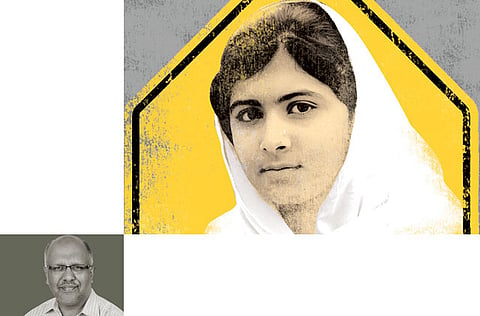Saluting Malala’s spirit
Unlike Malala, Pakistan’s top leaders seem to be surrounded by bunker mentality

The tragic shooting of Malala Yousufzai in the past week has grabbed the headlines across Pakistan, in a powerful reminder of the continuing challenge to the country’s security posed by diehard militants.
But Malala Yousufzai’s example is no less than that of the ultimate heroine of good cause, steadfastly refusing to back down in the face of blatant injustice and inhumanity.
In Pakistan’s northern Swat region, from where Yousufzai became a popular and ultimately an iconic figure, as a teenaged schoolgirl campaigning for the right of women to a quality education, hers is a message that is badly needed.
Unlike other parts of Pakistan, the Swat valley has faced an unprecedented security crisis. In 2009, the Pakistan army was eventually deployed to tackle a stubborn insurgency, following several months of rapidly growing uncertainty across Swat. The army’s campaign, which involved the loss of many precious lives, finally brought the territory under control after militants were beaten back and forced in to a retreat.
Tragically, however, a hard earned victory in a part of Pakistan, which was in danger of being seized by senseless militants, appears to have been partially squandered.
Like so much else that is going seriously wrong in Pakistan under the country’s present ruling dispensation, the military victory has just not been followed quickly enough by a political and economic rehabilitation campaign to permanently block those who sought to seize control of Swat.
Three years after a gang of diehard militants, who sought to seize Swat and were beaten back, the region remains far removed from its once widely-known reputation as a honeymoon haven for couples seeking to spend time in a picturesque valley.
Though the scenic beauty of Swat in the past has been compared to the scenery that is associated with Switzerland, the region is just nowhere near the calm and serenity which surrounds the European haven. Pakistan’s ruling elite has spent the past three years in consolidating their own positions rather than attentively looking to focus on troublesome issues that surround Pakistan. In sharp contrast to the many challenges that dominate Swat, the government of President Asif Ali Zardari has been more obsessed on other fronts, on matters like saving the president from being investigated in Switzerland on allegations of corruption.
Consequently, the neglect in Swat has only deepened the challenge of treating a set of circumstances where a military success gave the space to a more enduring solution. In sharp contrast to Malala, who bravely came out in public to defend the right of women’s education, Pakistan’s top leaders — right up to the president — appear to be surrounded by what could best be described as a bunker mentality.
Though the tragedy that has beset Malala has brought out one key politician after another, offering to pay for her medical treatment from their wealth, which may or may not have been legitimately acquired, there are compelling questions which remain unanswered.
For instance, for regimes in Islamabad or the northern Khyber Pakhtunkhwa region, where Swat is located, when was the last time that a ruling politician from either or indeed both of these dispensations travelled up to Swat to lead a consolidation effort right from the front? To that compelling question, the average Pakistani may not have an instant answer because there is none.
Malala, on the other hand, stood up for her home turf, not just in Swat, but indeed for the rest of Pakistan, surrounded by a powerful security challenge to confront any state. Unlike the politicians who operate from their bunkers deep inside their ruling ivory towers, Malala continued to bravely go about her daily life, knowing well the risks associated with her choice.
In saluting Malala, Pakistanis must be reminded that the best hope for their country remains associated with such courageous individuals. Going forward, beyond just the lip service coming from Pakistan’s ruling politicians, nothing is likely to change on the ground either in Swat or elsewhere in Pakistan.
The country’s complacency-ridden ruling structure will just not see the light of the day in spite of frequent expressions of a new resolve to beat back the tide of militancy in Swat. However, Pakistan’s history has thrown up numerous lessons of one Malala after another, standing up for a righteous cause.
The assassin sent to shoot Malala failed not because his bullet missed its intended target. The failure came because Malala is a school of thought shared by many others in a country dominated by a widely tainted ruling structure.
Farhan Bokhari is a Pakistan-based commentator who writes on political and economic matters.
Sign up for the Daily Briefing
Get the latest news and updates straight to your inbox



